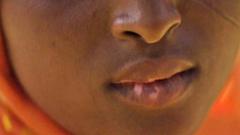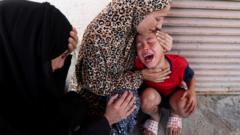**Fatima's experience serves as a cautionary tale, highlighting the societal stigmas surrounding skin tone and the dire consequences of harmful beauty practices.**
**Mother's Regret Over Skin-Lightening Products Used on Children**

**Mother's Regret Over Skin-Lightening Products Used on Children**
**A Nigerian mother's painful journey reveals the hidden dangers of skin-whitening creams, deeply rooted in cultural pressures.**
In a heart-wrenching narrative from Kano, northern Nigeria, a mother identified as Fatima shares the painful consequences of using skin-whitening creams on her six children. At 32, she is grappling with the long-term effects these products have had on her kids, including visible burns and scars that have caused them emotional distress. Fatima, driven by familial pressures and societal expectations surrounding skin tone, initially believed the creams would improve her children's acceptance within the family and community.
Describing her struggles, she reveals the heartache of one daughter who feels compelled to cover her face in public to hide her injuries, while another has skin discolored in stark contrast to the surrounding areas. Fatima's toddler suffers from ongoing wounds, signaling a troubling outcome from their use of these unregulated products.
The prevalence of skin-lightening practices in Nigeria is alarming, as a staggering 77% of women reportedly use such creams regularly. These products, often containing harmful substances like hydroquinone and mercury, are frequently sold without appropriate medical advice, leading to serious health risks, including kidney damage and skin infections.
The obsession with lighter skin has profound cultural ties in Nigeria, often associated with beauty and status. Fatima shares her experience of familial favoritism based on skin tone, which pushed her to use these harmful creams on her children, a decision she now regrets deeply. Her daughters have faced social discrimination, with peers mistakenly accusing them of drug use because of the characteristic discoloration left by the creams, further exacerbating their emotional scars.
During a visit to a busy market in Kano, Fatima witnessed the booming trade of skin-lightening creams, created on demand by "mixologists." Many vendors unabashedly incorporate dangerous chemicals into their products, despite awareness of the risks. A considerable number of customers continue this cycle, believing that lighter skin will guarantee social acceptance and a better life for their children.
Amidst this distressing environment, Nigeria's National Agency for Food and Drug Administration and Control (Nafdac) is working to combat the distribution of these harmful substances. However, challenges abound in enforcing regulations and educating the public about the dangers of skin whitening.
In an effort to atone for her past, Fatima now speaks out against the harmful practices she once embraced, urging other parents to consider the lasting consequences of skin bleaching. Her story is a poignant reminder of the pressures and stigmas that can lead to decisions with life-altering repercussions. Fatima's hope is that by sharing her experience, others can avoid the pain her family has endured.
Describing her struggles, she reveals the heartache of one daughter who feels compelled to cover her face in public to hide her injuries, while another has skin discolored in stark contrast to the surrounding areas. Fatima's toddler suffers from ongoing wounds, signaling a troubling outcome from their use of these unregulated products.
The prevalence of skin-lightening practices in Nigeria is alarming, as a staggering 77% of women reportedly use such creams regularly. These products, often containing harmful substances like hydroquinone and mercury, are frequently sold without appropriate medical advice, leading to serious health risks, including kidney damage and skin infections.
The obsession with lighter skin has profound cultural ties in Nigeria, often associated with beauty and status. Fatima shares her experience of familial favoritism based on skin tone, which pushed her to use these harmful creams on her children, a decision she now regrets deeply. Her daughters have faced social discrimination, with peers mistakenly accusing them of drug use because of the characteristic discoloration left by the creams, further exacerbating their emotional scars.
During a visit to a busy market in Kano, Fatima witnessed the booming trade of skin-lightening creams, created on demand by "mixologists." Many vendors unabashedly incorporate dangerous chemicals into their products, despite awareness of the risks. A considerable number of customers continue this cycle, believing that lighter skin will guarantee social acceptance and a better life for their children.
Amidst this distressing environment, Nigeria's National Agency for Food and Drug Administration and Control (Nafdac) is working to combat the distribution of these harmful substances. However, challenges abound in enforcing regulations and educating the public about the dangers of skin whitening.
In an effort to atone for her past, Fatima now speaks out against the harmful practices she once embraced, urging other parents to consider the lasting consequences of skin bleaching. Her story is a poignant reminder of the pressures and stigmas that can lead to decisions with life-altering repercussions. Fatima's hope is that by sharing her experience, others can avoid the pain her family has endured.

















